Values, Ethics and Collaborative Working: A Portfolio of Tasks Report
VerifiedAdded on 2022/12/19
|14
|3872
|62
Homework Assignment
AI Summary
This assignment delves into the realms of values, ethics, and collaborative working within an organizational context. It begins by defining ethics and exploring factors influencing ethical behavior, including a case study of Boohoo Group Plc. The importance of workplace ethics is then discussed, along with relevant UK laws promoting ethical practices, such as the Human Rights Act and the National Minimum Wage Act. The assignment then transitions to social work and corporate social responsibility, using Marks & Spencer as an example. It examines ethical leadership, discrimination, and the importance of integrity, objectivity, and confidentiality. The General Data Protection Regulation (GDPR) is also analyzed. Finally, the assignment focuses on collaborative working, defining it and exploring strategies, values, interpersonal skills, benefits, and the promotion of equality, diversity, and British values. The consequences of poor collaborative working are also examined. The assignment provides a comprehensive overview of these interconnected concepts, emphasizing their significance in fostering a positive and productive work environment.
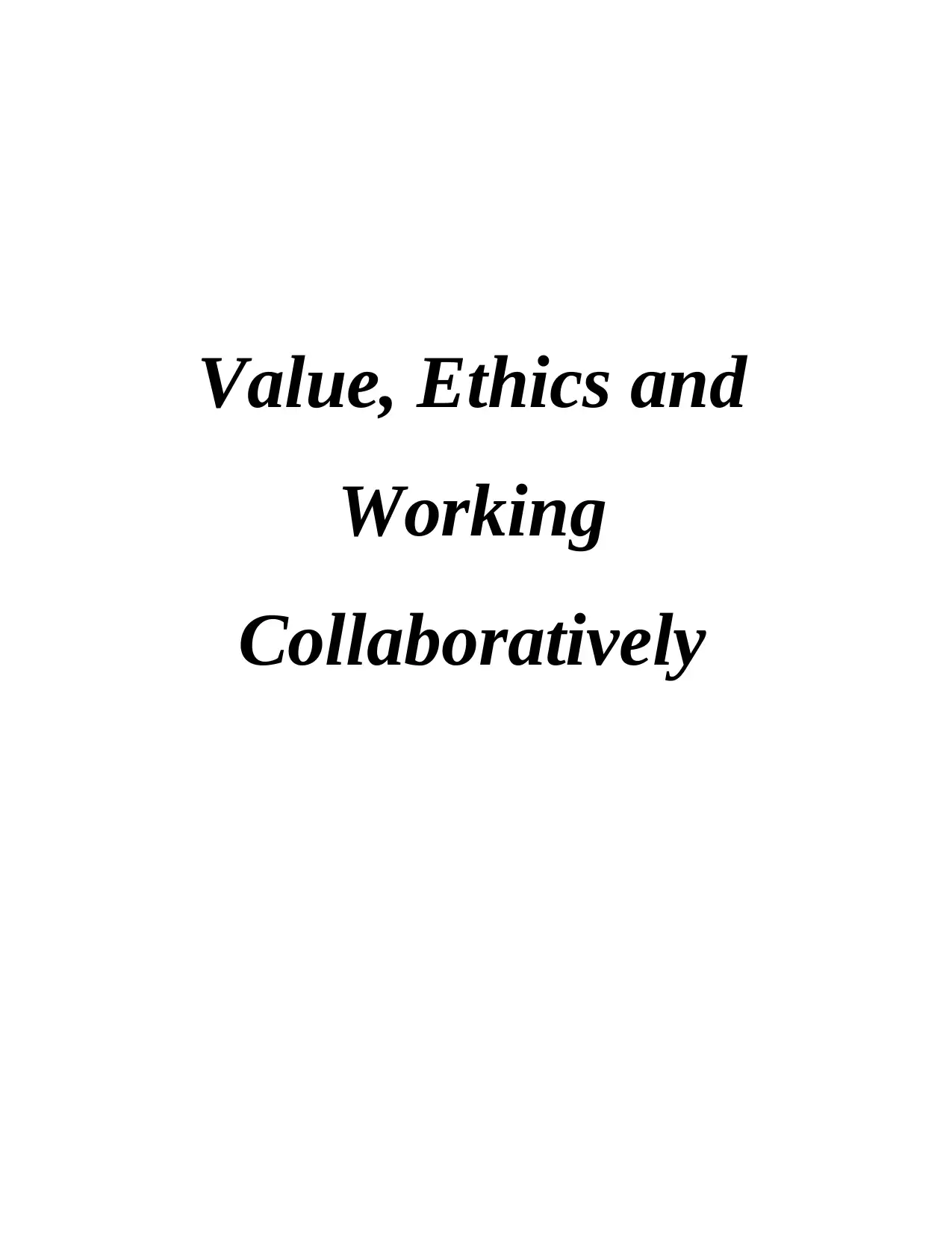
Value, Ethics and
Working
Collaboratively
Working
Collaboratively
Paraphrase This Document
Need a fresh take? Get an instant paraphrase of this document with our AI Paraphraser
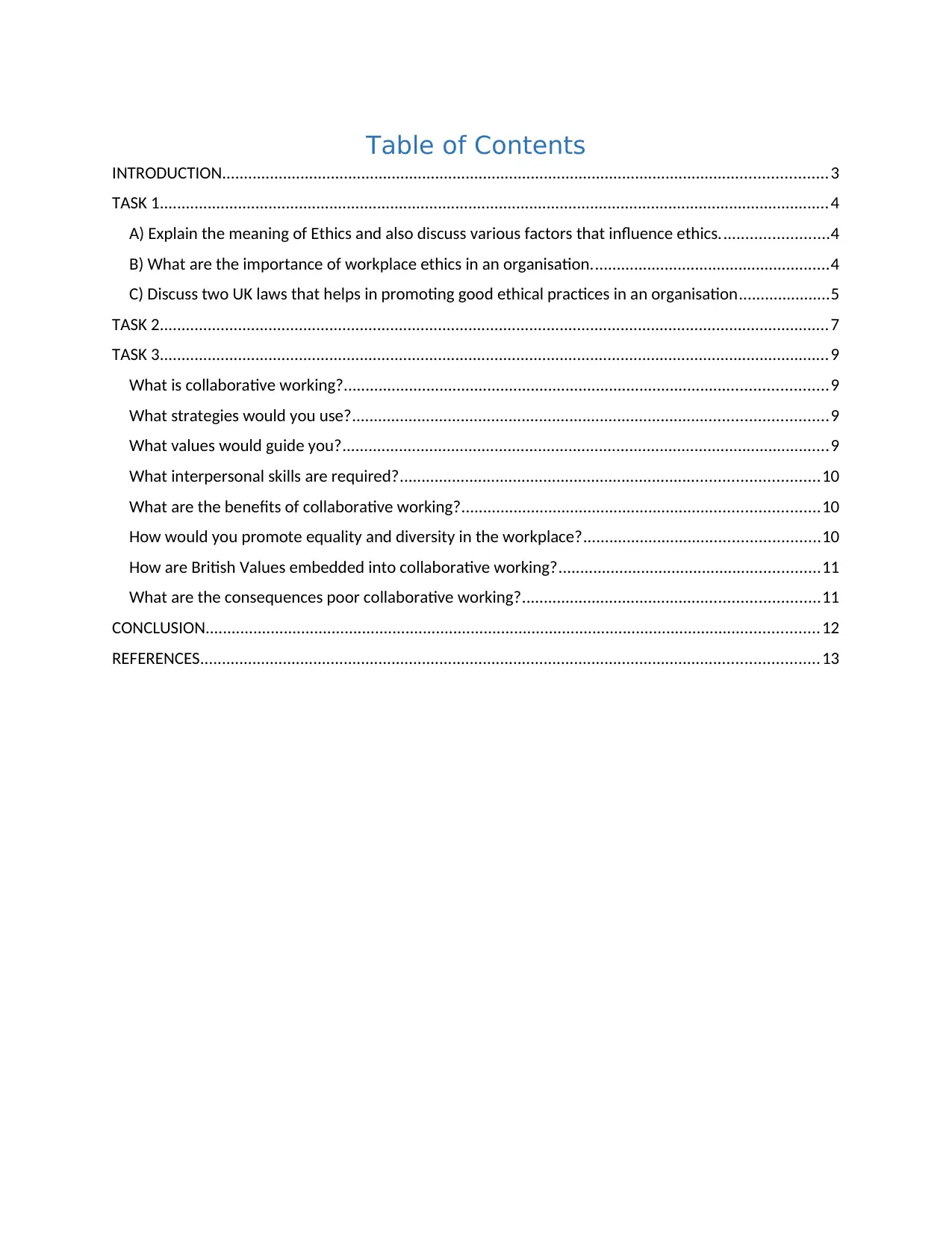
Table of Contents
INTRODUCTION...........................................................................................................................................3
TASK 1..........................................................................................................................................................4
A) Explain the meaning of Ethics and also discuss various factors that influence ethics.........................4
B) What are the importance of workplace ethics in an organisation.......................................................4
C) Discuss two UK laws that helps in promoting good ethical practices in an organisation.....................5
TASK 2..........................................................................................................................................................7
TASK 3..........................................................................................................................................................9
What is collaborative working?...............................................................................................................9
What strategies would you use?.............................................................................................................9
What values would guide you?................................................................................................................9
What interpersonal skills are required?................................................................................................10
What are the benefits of collaborative working?..................................................................................10
How would you promote equality and diversity in the workplace?......................................................10
How are British Values embedded into collaborative working?............................................................11
What are the consequences poor collaborative working?....................................................................11
CONCLUSION.............................................................................................................................................12
REFERENCES..............................................................................................................................................13
INTRODUCTION...........................................................................................................................................3
TASK 1..........................................................................................................................................................4
A) Explain the meaning of Ethics and also discuss various factors that influence ethics.........................4
B) What are the importance of workplace ethics in an organisation.......................................................4
C) Discuss two UK laws that helps in promoting good ethical practices in an organisation.....................5
TASK 2..........................................................................................................................................................7
TASK 3..........................................................................................................................................................9
What is collaborative working?...............................................................................................................9
What strategies would you use?.............................................................................................................9
What values would guide you?................................................................................................................9
What interpersonal skills are required?................................................................................................10
What are the benefits of collaborative working?..................................................................................10
How would you promote equality and diversity in the workplace?......................................................10
How are British Values embedded into collaborative working?............................................................11
What are the consequences poor collaborative working?....................................................................11
CONCLUSION.............................................................................................................................................12
REFERENCES..............................................................................................................................................13
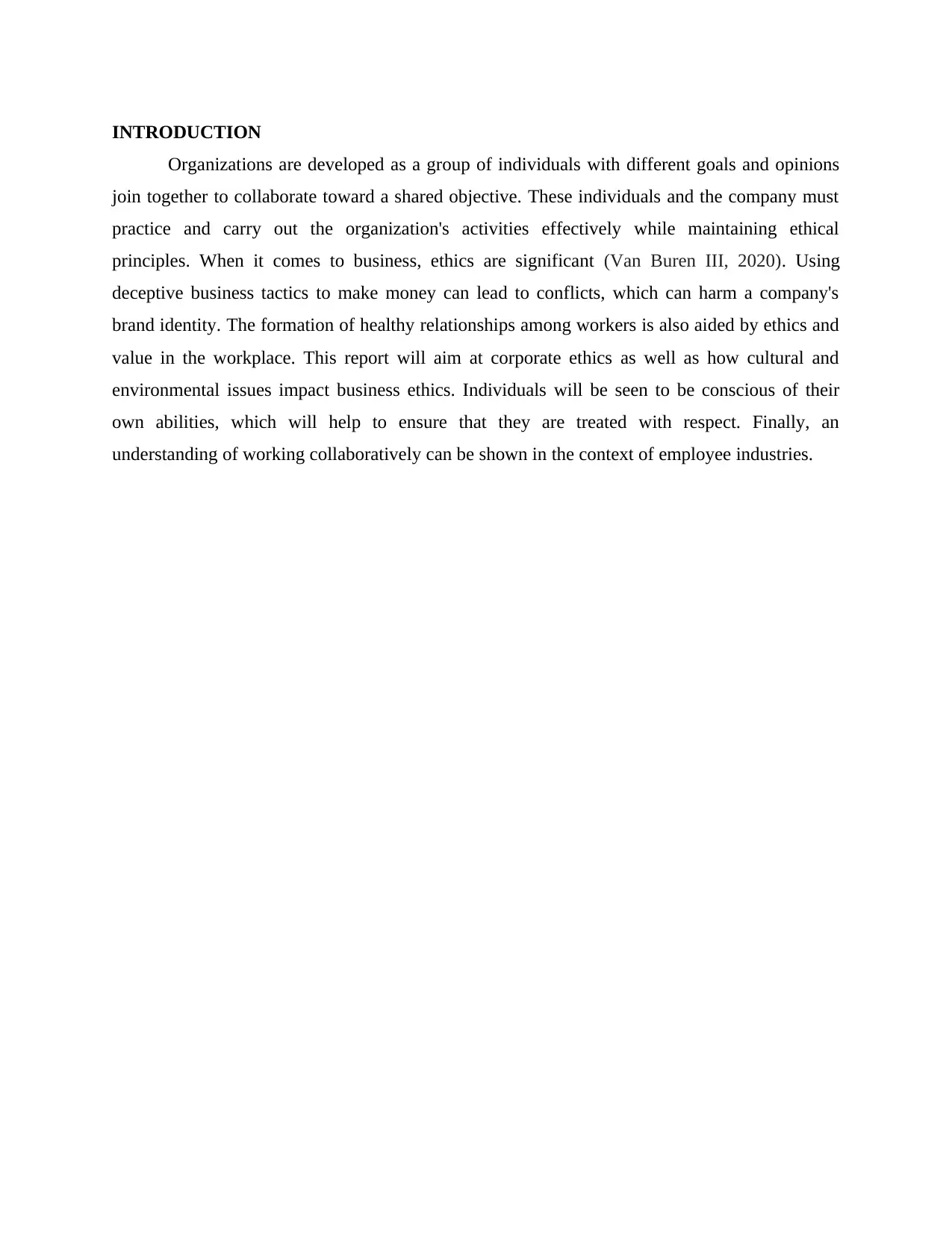
INTRODUCTION
Organizations are developed as a group of individuals with different goals and opinions
join together to collaborate toward a shared objective. These individuals and the company must
practice and carry out the organization's activities effectively while maintaining ethical
principles. When it comes to business, ethics are significant (Van Buren III, 2020). Using
deceptive business tactics to make money can lead to conflicts, which can harm a company's
brand identity. The formation of healthy relationships among workers is also aided by ethics and
value in the workplace. This report will aim at corporate ethics as well as how cultural and
environmental issues impact business ethics. Individuals will be seen to be conscious of their
own abilities, which will help to ensure that they are treated with respect. Finally, an
understanding of working collaboratively can be shown in the context of employee industries.
Organizations are developed as a group of individuals with different goals and opinions
join together to collaborate toward a shared objective. These individuals and the company must
practice and carry out the organization's activities effectively while maintaining ethical
principles. When it comes to business, ethics are significant (Van Buren III, 2020). Using
deceptive business tactics to make money can lead to conflicts, which can harm a company's
brand identity. The formation of healthy relationships among workers is also aided by ethics and
value in the workplace. This report will aim at corporate ethics as well as how cultural and
environmental issues impact business ethics. Individuals will be seen to be conscious of their
own abilities, which will help to ensure that they are treated with respect. Finally, an
understanding of working collaboratively can be shown in the context of employee industries.
⊘ This is a preview!⊘
Do you want full access?
Subscribe today to unlock all pages.

Trusted by 1+ million students worldwide
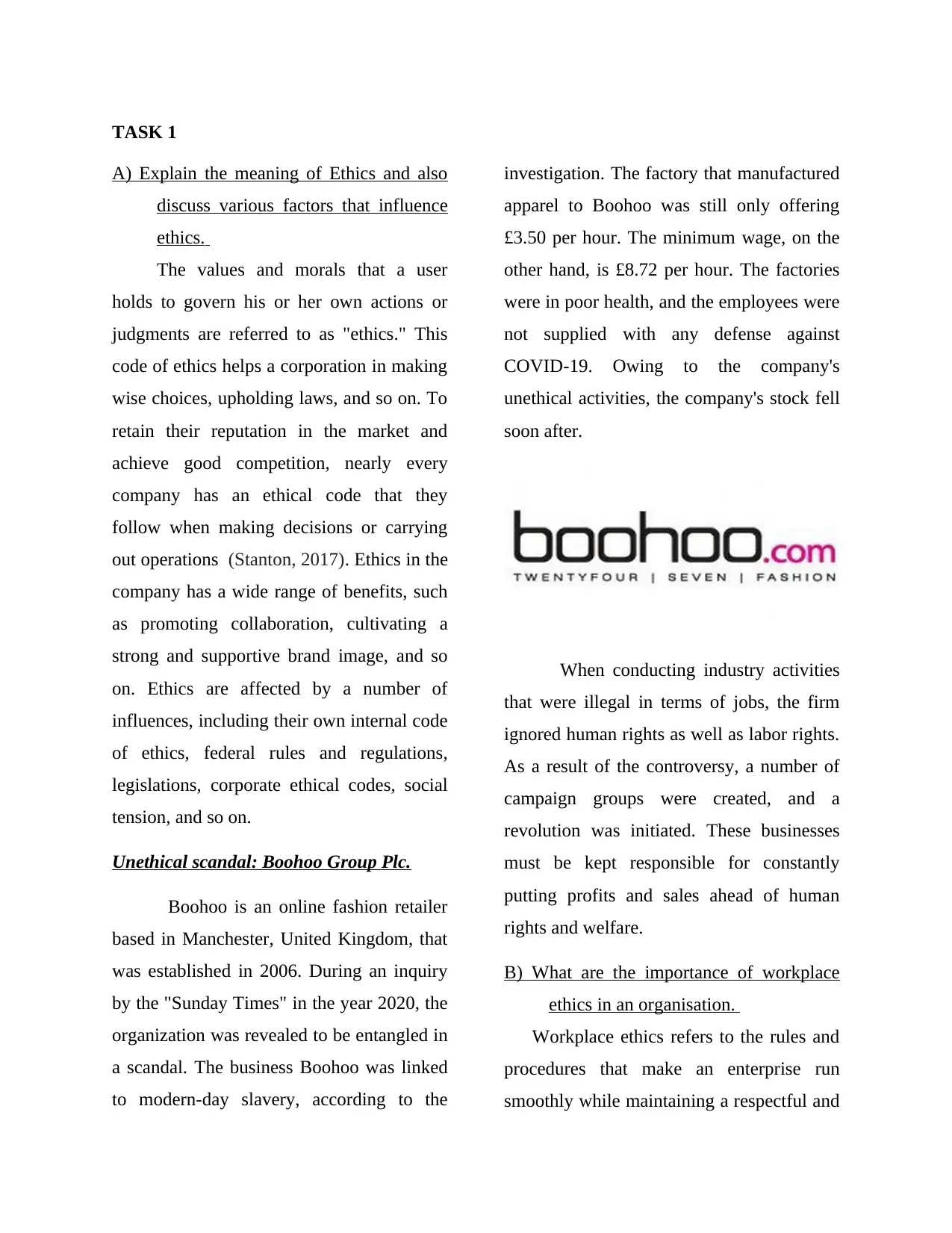
TASK 1
A) Explain the meaning of Ethics and also
discuss various factors that influence
ethics.
The values and morals that a user
holds to govern his or her own actions or
judgments are referred to as "ethics." This
code of ethics helps a corporation in making
wise choices, upholding laws, and so on. To
retain their reputation in the market and
achieve good competition, nearly every
company has an ethical code that they
follow when making decisions or carrying
out operations (Stanton, 2017). Ethics in the
company has a wide range of benefits, such
as promoting collaboration, cultivating a
strong and supportive brand image, and so
on. Ethics are affected by a number of
influences, including their own internal code
of ethics, federal rules and regulations,
legislations, corporate ethical codes, social
tension, and so on.
Unethical scandal: Boohoo Group Plc.
Boohoo is an online fashion retailer
based in Manchester, United Kingdom, that
was established in 2006. During an inquiry
by the "Sunday Times" in the year 2020, the
organization was revealed to be entangled in
a scandal. The business Boohoo was linked
to modern-day slavery, according to the
investigation. The factory that manufactured
apparel to Boohoo was still only offering
£3.50 per hour. The minimum wage, on the
other hand, is £8.72 per hour. The factories
were in poor health, and the employees were
not supplied with any defense against
COVID-19. Owing to the company's
unethical activities, the company's stock fell
soon after.
When conducting industry activities
that were illegal in terms of jobs, the firm
ignored human rights as well as labor rights.
As a result of the controversy, a number of
campaign groups were created, and a
revolution was initiated. These businesses
must be kept responsible for constantly
putting profits and sales ahead of human
rights and welfare.
B) What are the importance of workplace
ethics in an organisation.
Workplace ethics refers to the rules and
procedures that make an enterprise run
smoothly while maintaining a respectful and
A) Explain the meaning of Ethics and also
discuss various factors that influence
ethics.
The values and morals that a user
holds to govern his or her own actions or
judgments are referred to as "ethics." This
code of ethics helps a corporation in making
wise choices, upholding laws, and so on. To
retain their reputation in the market and
achieve good competition, nearly every
company has an ethical code that they
follow when making decisions or carrying
out operations (Stanton, 2017). Ethics in the
company has a wide range of benefits, such
as promoting collaboration, cultivating a
strong and supportive brand image, and so
on. Ethics are affected by a number of
influences, including their own internal code
of ethics, federal rules and regulations,
legislations, corporate ethical codes, social
tension, and so on.
Unethical scandal: Boohoo Group Plc.
Boohoo is an online fashion retailer
based in Manchester, United Kingdom, that
was established in 2006. During an inquiry
by the "Sunday Times" in the year 2020, the
organization was revealed to be entangled in
a scandal. The business Boohoo was linked
to modern-day slavery, according to the
investigation. The factory that manufactured
apparel to Boohoo was still only offering
£3.50 per hour. The minimum wage, on the
other hand, is £8.72 per hour. The factories
were in poor health, and the employees were
not supplied with any defense against
COVID-19. Owing to the company's
unethical activities, the company's stock fell
soon after.
When conducting industry activities
that were illegal in terms of jobs, the firm
ignored human rights as well as labor rights.
As a result of the controversy, a number of
campaign groups were created, and a
revolution was initiated. These businesses
must be kept responsible for constantly
putting profits and sales ahead of human
rights and welfare.
B) What are the importance of workplace
ethics in an organisation.
Workplace ethics refers to the rules and
procedures that make an enterprise run
smoothly while maintaining a respectful and
Paraphrase This Document
Need a fresh take? Get an instant paraphrase of this document with our AI Paraphraser
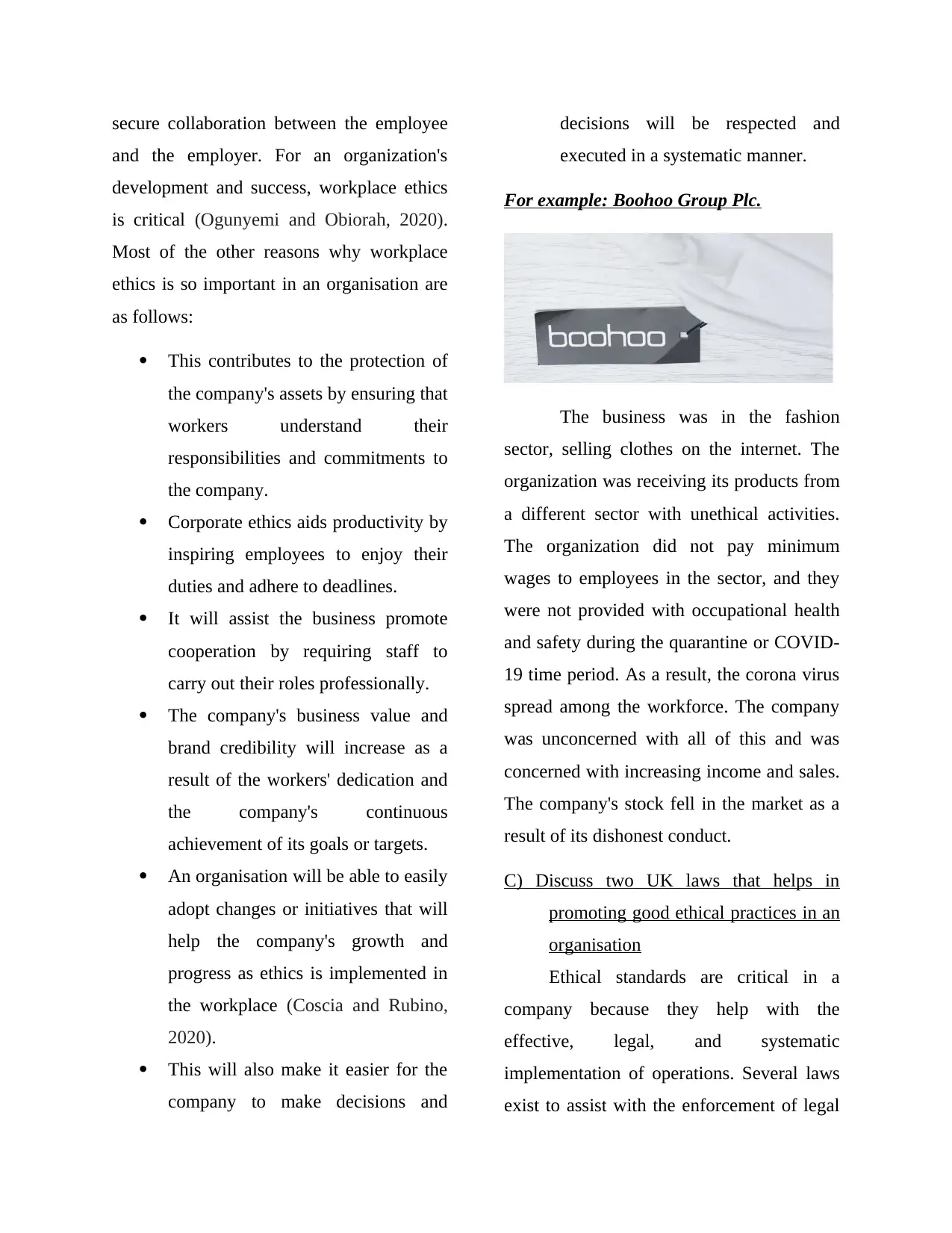
secure collaboration between the employee
and the employer. For an organization's
development and success, workplace ethics
is critical (Ogunyemi and Obiorah, 2020).
Most of the other reasons why workplace
ethics is so important in an organisation are
as follows:
This contributes to the protection of
the company's assets by ensuring that
workers understand their
responsibilities and commitments to
the company.
Corporate ethics aids productivity by
inspiring employees to enjoy their
duties and adhere to deadlines.
It will assist the business promote
cooperation by requiring staff to
carry out their roles professionally.
The company's business value and
brand credibility will increase as a
result of the workers' dedication and
the company's continuous
achievement of its goals or targets.
An organisation will be able to easily
adopt changes or initiatives that will
help the company's growth and
progress as ethics is implemented in
the workplace (Coscia and Rubino,
2020).
This will also make it easier for the
company to make decisions and
decisions will be respected and
executed in a systematic manner.
For example: Boohoo Group Plc.
The business was in the fashion
sector, selling clothes on the internet. The
organization was receiving its products from
a different sector with unethical activities.
The organization did not pay minimum
wages to employees in the sector, and they
were not provided with occupational health
and safety during the quarantine or COVID-
19 time period. As a result, the corona virus
spread among the workforce. The company
was unconcerned with all of this and was
concerned with increasing income and sales.
The company's stock fell in the market as a
result of its dishonest conduct.
C) Discuss two UK laws that helps in
promoting good ethical practices in an
organisation
Ethical standards are critical in a
company because they help with the
effective, legal, and systematic
implementation of operations. Several laws
exist to assist with the enforcement of legal
and the employer. For an organization's
development and success, workplace ethics
is critical (Ogunyemi and Obiorah, 2020).
Most of the other reasons why workplace
ethics is so important in an organisation are
as follows:
This contributes to the protection of
the company's assets by ensuring that
workers understand their
responsibilities and commitments to
the company.
Corporate ethics aids productivity by
inspiring employees to enjoy their
duties and adhere to deadlines.
It will assist the business promote
cooperation by requiring staff to
carry out their roles professionally.
The company's business value and
brand credibility will increase as a
result of the workers' dedication and
the company's continuous
achievement of its goals or targets.
An organisation will be able to easily
adopt changes or initiatives that will
help the company's growth and
progress as ethics is implemented in
the workplace (Coscia and Rubino,
2020).
This will also make it easier for the
company to make decisions and
decisions will be respected and
executed in a systematic manner.
For example: Boohoo Group Plc.
The business was in the fashion
sector, selling clothes on the internet. The
organization was receiving its products from
a different sector with unethical activities.
The organization did not pay minimum
wages to employees in the sector, and they
were not provided with occupational health
and safety during the quarantine or COVID-
19 time period. As a result, the corona virus
spread among the workforce. The company
was unconcerned with all of this and was
concerned with increasing income and sales.
The company's stock fell in the market as a
result of its dishonest conduct.
C) Discuss two UK laws that helps in
promoting good ethical practices in an
organisation
Ethical standards are critical in a
company because they help with the
effective, legal, and systematic
implementation of operations. Several laws
exist to assist with the enforcement of legal
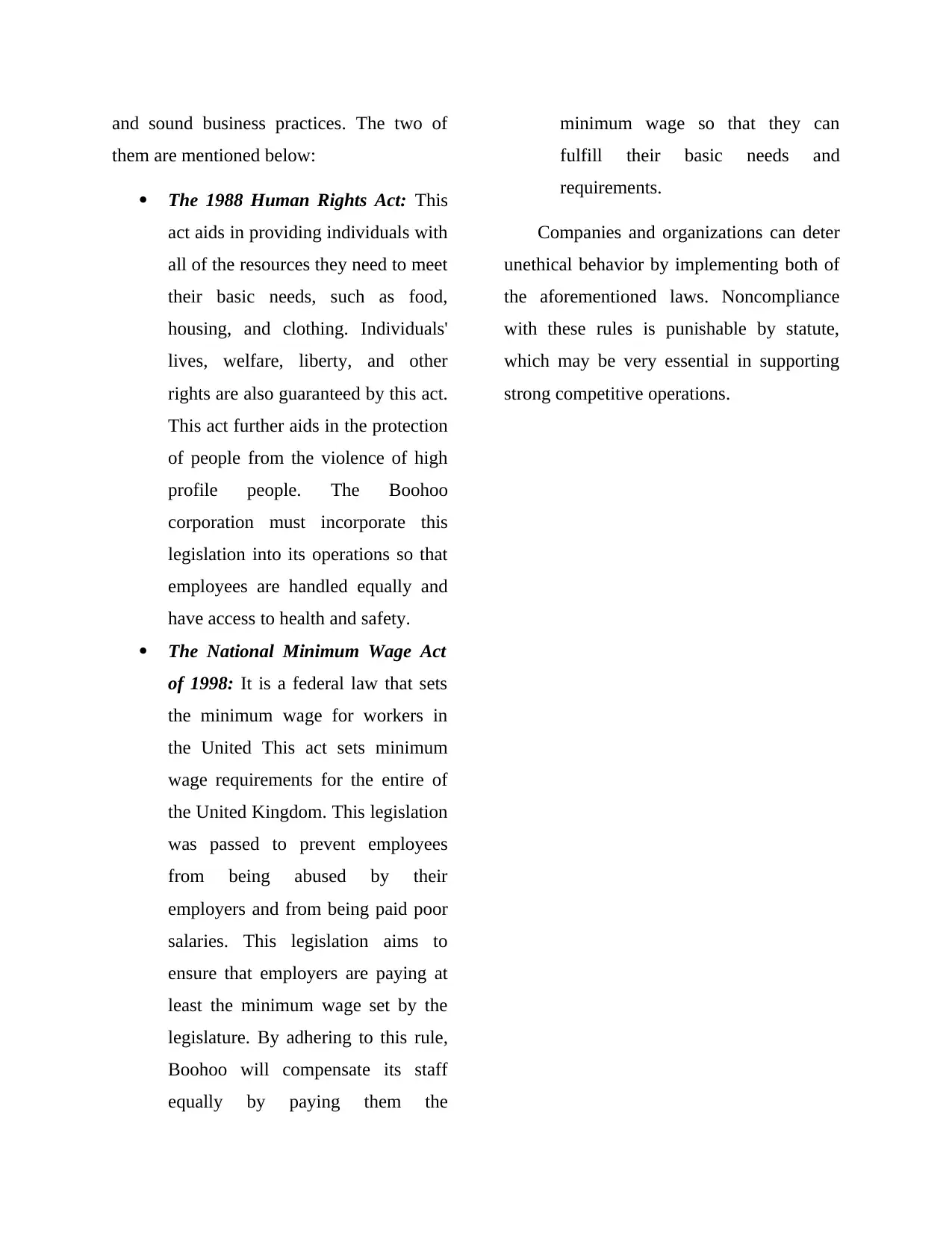
and sound business practices. The two of
them are mentioned below:
The 1988 Human Rights Act: This
act aids in providing individuals with
all of the resources they need to meet
their basic needs, such as food,
housing, and clothing. Individuals'
lives, welfare, liberty, and other
rights are also guaranteed by this act.
This act further aids in the protection
of people from the violence of high
profile people. The Boohoo
corporation must incorporate this
legislation into its operations so that
employees are handled equally and
have access to health and safety.
The National Minimum Wage Act
of 1998: It is a federal law that sets
the minimum wage for workers in
the United This act sets minimum
wage requirements for the entire of
the United Kingdom. This legislation
was passed to prevent employees
from being abused by their
employers and from being paid poor
salaries. This legislation aims to
ensure that employers are paying at
least the minimum wage set by the
legislature. By adhering to this rule,
Boohoo will compensate its staff
equally by paying them the
minimum wage so that they can
fulfill their basic needs and
requirements.
Companies and organizations can deter
unethical behavior by implementing both of
the aforementioned laws. Noncompliance
with these rules is punishable by statute,
which may be very essential in supporting
strong competitive operations.
them are mentioned below:
The 1988 Human Rights Act: This
act aids in providing individuals with
all of the resources they need to meet
their basic needs, such as food,
housing, and clothing. Individuals'
lives, welfare, liberty, and other
rights are also guaranteed by this act.
This act further aids in the protection
of people from the violence of high
profile people. The Boohoo
corporation must incorporate this
legislation into its operations so that
employees are handled equally and
have access to health and safety.
The National Minimum Wage Act
of 1998: It is a federal law that sets
the minimum wage for workers in
the United This act sets minimum
wage requirements for the entire of
the United Kingdom. This legislation
was passed to prevent employees
from being abused by their
employers and from being paid poor
salaries. This legislation aims to
ensure that employers are paying at
least the minimum wage set by the
legislature. By adhering to this rule,
Boohoo will compensate its staff
equally by paying them the
minimum wage so that they can
fulfill their basic needs and
requirements.
Companies and organizations can deter
unethical behavior by implementing both of
the aforementioned laws. Noncompliance
with these rules is punishable by statute,
which may be very essential in supporting
strong competitive operations.
⊘ This is a preview!⊘
Do you want full access?
Subscribe today to unlock all pages.

Trusted by 1+ million students worldwide

Paraphrase This Document
Need a fresh take? Get an instant paraphrase of this document with our AI Paraphraser
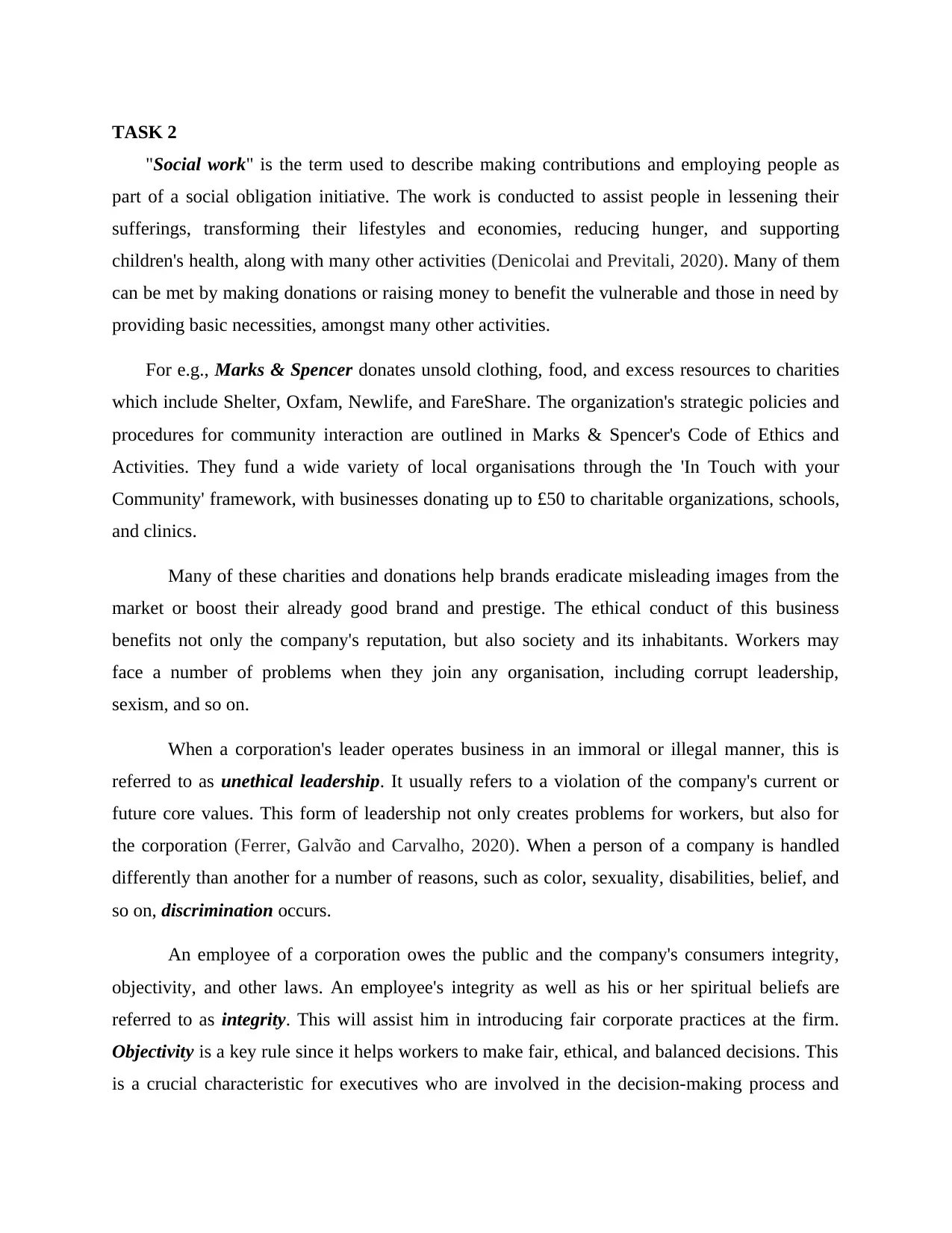
TASK 2
"Social work" is the term used to describe making contributions and employing people as
part of a social obligation initiative. The work is conducted to assist people in lessening their
sufferings, transforming their lifestyles and economies, reducing hunger, and supporting
children's health, along with many other activities (Denicolai and Previtali, 2020). Many of them
can be met by making donations or raising money to benefit the vulnerable and those in need by
providing basic necessities, amongst many other activities.
For e.g., Marks & Spencer donates unsold clothing, food, and excess resources to charities
which include Shelter, Oxfam, Newlife, and FareShare. The organization's strategic policies and
procedures for community interaction are outlined in Marks & Spencer's Code of Ethics and
Activities. They fund a wide variety of local organisations through the 'In Touch with your
Community' framework, with businesses donating up to £50 to charitable organizations, schools,
and clinics.
Many of these charities and donations help brands eradicate misleading images from the
market or boost their already good brand and prestige. The ethical conduct of this business
benefits not only the company's reputation, but also society and its inhabitants. Workers may
face a number of problems when they join any organisation, including corrupt leadership,
sexism, and so on.
When a corporation's leader operates business in an immoral or illegal manner, this is
referred to as unethical leadership. It usually refers to a violation of the company's current or
future core values. This form of leadership not only creates problems for workers, but also for
the corporation (Ferrer, Galvão and Carvalho, 2020). When a person of a company is handled
differently than another for a number of reasons, such as color, sexuality, disabilities, belief, and
so on, discrimination occurs.
An employee of a corporation owes the public and the company's consumers integrity,
objectivity, and other laws. An employee's integrity as well as his or her spiritual beliefs are
referred to as integrity. This will assist him in introducing fair corporate practices at the firm.
Objectivity is a key rule since it helps workers to make fair, ethical, and balanced decisions. This
is a crucial characteristic for executives who are involved in the decision-making process and
"Social work" is the term used to describe making contributions and employing people as
part of a social obligation initiative. The work is conducted to assist people in lessening their
sufferings, transforming their lifestyles and economies, reducing hunger, and supporting
children's health, along with many other activities (Denicolai and Previtali, 2020). Many of them
can be met by making donations or raising money to benefit the vulnerable and those in need by
providing basic necessities, amongst many other activities.
For e.g., Marks & Spencer donates unsold clothing, food, and excess resources to charities
which include Shelter, Oxfam, Newlife, and FareShare. The organization's strategic policies and
procedures for community interaction are outlined in Marks & Spencer's Code of Ethics and
Activities. They fund a wide variety of local organisations through the 'In Touch with your
Community' framework, with businesses donating up to £50 to charitable organizations, schools,
and clinics.
Many of these charities and donations help brands eradicate misleading images from the
market or boost their already good brand and prestige. The ethical conduct of this business
benefits not only the company's reputation, but also society and its inhabitants. Workers may
face a number of problems when they join any organisation, including corrupt leadership,
sexism, and so on.
When a corporation's leader operates business in an immoral or illegal manner, this is
referred to as unethical leadership. It usually refers to a violation of the company's current or
future core values. This form of leadership not only creates problems for workers, but also for
the corporation (Ferrer, Galvão and Carvalho, 2020). When a person of a company is handled
differently than another for a number of reasons, such as color, sexuality, disabilities, belief, and
so on, discrimination occurs.
An employee of a corporation owes the public and the company's consumers integrity,
objectivity, and other laws. An employee's integrity as well as his or her spiritual beliefs are
referred to as integrity. This will assist him in introducing fair corporate practices at the firm.
Objectivity is a key rule since it helps workers to make fair, ethical, and balanced decisions. This
is a crucial characteristic for executives who are involved in the decision-making process and
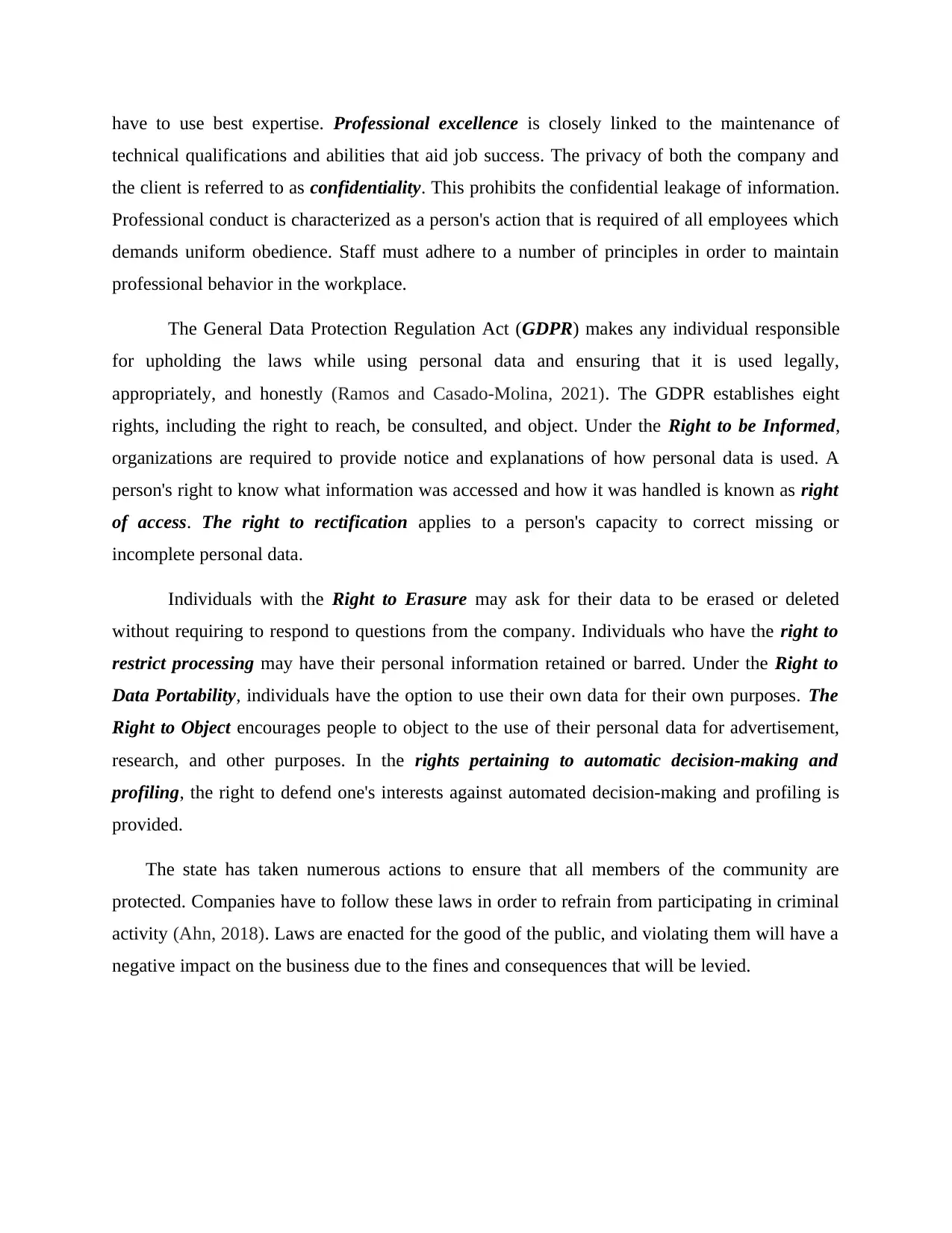
have to use best expertise. Professional excellence is closely linked to the maintenance of
technical qualifications and abilities that aid job success. The privacy of both the company and
the client is referred to as confidentiality. This prohibits the confidential leakage of information.
Professional conduct is characterized as a person's action that is required of all employees which
demands uniform obedience. Staff must adhere to a number of principles in order to maintain
professional behavior in the workplace.
The General Data Protection Regulation Act (GDPR) makes any individual responsible
for upholding the laws while using personal data and ensuring that it is used legally,
appropriately, and honestly (Ramos and Casado-Molina, 2021). The GDPR establishes eight
rights, including the right to reach, be consulted, and object. Under the Right to be Informed,
organizations are required to provide notice and explanations of how personal data is used. A
person's right to know what information was accessed and how it was handled is known as right
of access. The right to rectification applies to a person's capacity to correct missing or
incomplete personal data.
Individuals with the Right to Erasure may ask for their data to be erased or deleted
without requiring to respond to questions from the company. Individuals who have the right to
restrict processing may have their personal information retained or barred. Under the Right to
Data Portability, individuals have the option to use their own data for their own purposes. The
Right to Object encourages people to object to the use of their personal data for advertisement,
research, and other purposes. In the rights pertaining to automatic decision-making and
profiling, the right to defend one's interests against automated decision-making and profiling is
provided.
The state has taken numerous actions to ensure that all members of the community are
protected. Companies have to follow these laws in order to refrain from participating in criminal
activity (Ahn, 2018). Laws are enacted for the good of the public, and violating them will have a
negative impact on the business due to the fines and consequences that will be levied.
technical qualifications and abilities that aid job success. The privacy of both the company and
the client is referred to as confidentiality. This prohibits the confidential leakage of information.
Professional conduct is characterized as a person's action that is required of all employees which
demands uniform obedience. Staff must adhere to a number of principles in order to maintain
professional behavior in the workplace.
The General Data Protection Regulation Act (GDPR) makes any individual responsible
for upholding the laws while using personal data and ensuring that it is used legally,
appropriately, and honestly (Ramos and Casado-Molina, 2021). The GDPR establishes eight
rights, including the right to reach, be consulted, and object. Under the Right to be Informed,
organizations are required to provide notice and explanations of how personal data is used. A
person's right to know what information was accessed and how it was handled is known as right
of access. The right to rectification applies to a person's capacity to correct missing or
incomplete personal data.
Individuals with the Right to Erasure may ask for their data to be erased or deleted
without requiring to respond to questions from the company. Individuals who have the right to
restrict processing may have their personal information retained or barred. Under the Right to
Data Portability, individuals have the option to use their own data for their own purposes. The
Right to Object encourages people to object to the use of their personal data for advertisement,
research, and other purposes. In the rights pertaining to automatic decision-making and
profiling, the right to defend one's interests against automated decision-making and profiling is
provided.
The state has taken numerous actions to ensure that all members of the community are
protected. Companies have to follow these laws in order to refrain from participating in criminal
activity (Ahn, 2018). Laws are enacted for the good of the public, and violating them will have a
negative impact on the business due to the fines and consequences that will be levied.
⊘ This is a preview!⊘
Do you want full access?
Subscribe today to unlock all pages.

Trusted by 1+ million students worldwide
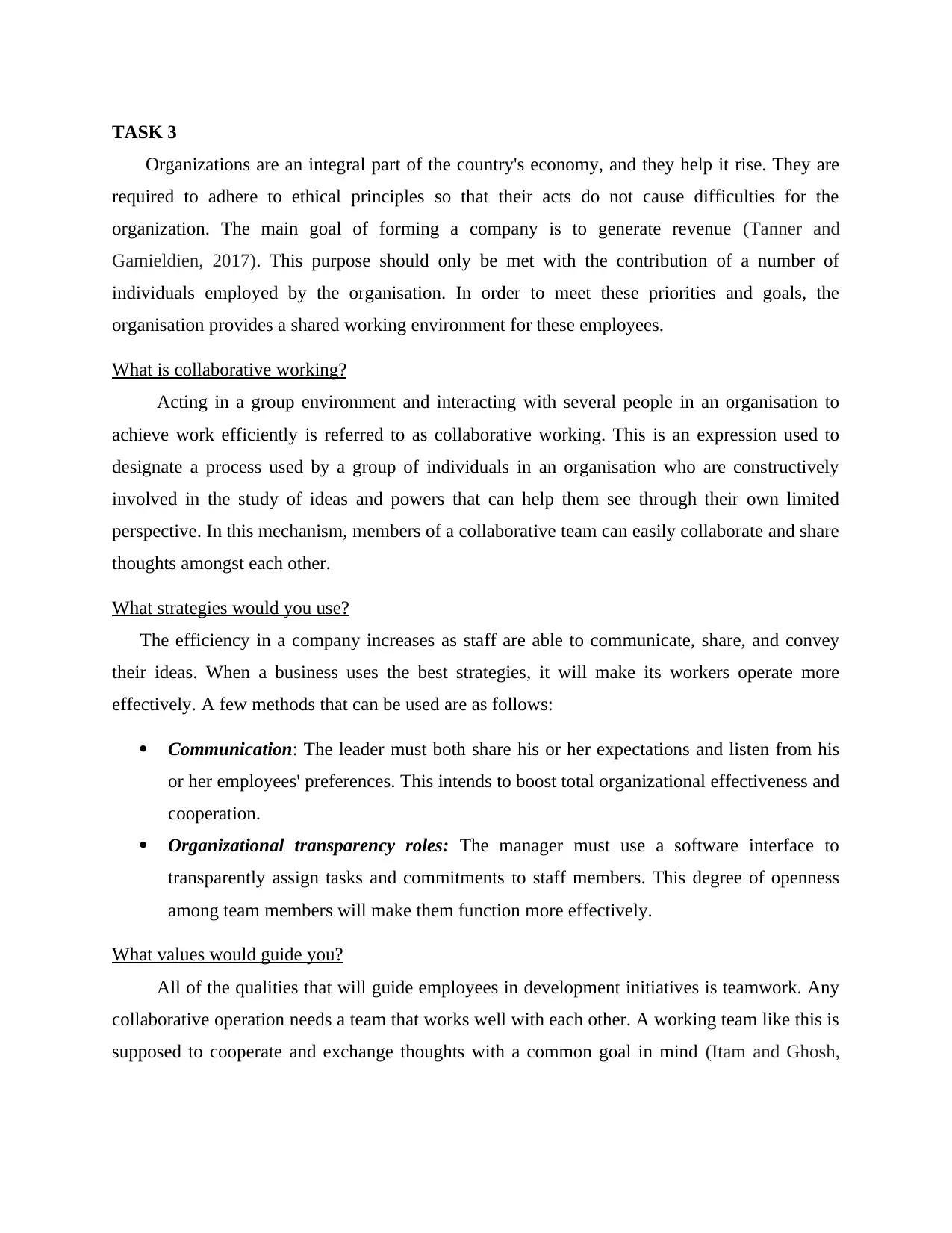
TASK 3
Organizations are an integral part of the country's economy, and they help it rise. They are
required to adhere to ethical principles so that their acts do not cause difficulties for the
organization. The main goal of forming a company is to generate revenue (Tanner and
Gamieldien, 2017). This purpose should only be met with the contribution of a number of
individuals employed by the organisation. In order to meet these priorities and goals, the
organisation provides a shared working environment for these employees.
What is collaborative working?
Acting in a group environment and interacting with several people in an organisation to
achieve work efficiently is referred to as collaborative working. This is an expression used to
designate a process used by a group of individuals in an organisation who are constructively
involved in the study of ideas and powers that can help them see through their own limited
perspective. In this mechanism, members of a collaborative team can easily collaborate and share
thoughts amongst each other.
What strategies would you use?
The efficiency in a company increases as staff are able to communicate, share, and convey
their ideas. When a business uses the best strategies, it will make its workers operate more
effectively. A few methods that can be used are as follows:
Communication: The leader must both share his or her expectations and listen from his
or her employees' preferences. This intends to boost total organizational effectiveness and
cooperation.
Organizational transparency roles: The manager must use a software interface to
transparently assign tasks and commitments to staff members. This degree of openness
among team members will make them function more effectively.
What values would guide you?
All of the qualities that will guide employees in development initiatives is teamwork. Any
collaborative operation needs a team that works well with each other. A working team like this is
supposed to cooperate and exchange thoughts with a common goal in mind (Itam and Ghosh,
Organizations are an integral part of the country's economy, and they help it rise. They are
required to adhere to ethical principles so that their acts do not cause difficulties for the
organization. The main goal of forming a company is to generate revenue (Tanner and
Gamieldien, 2017). This purpose should only be met with the contribution of a number of
individuals employed by the organisation. In order to meet these priorities and goals, the
organisation provides a shared working environment for these employees.
What is collaborative working?
Acting in a group environment and interacting with several people in an organisation to
achieve work efficiently is referred to as collaborative working. This is an expression used to
designate a process used by a group of individuals in an organisation who are constructively
involved in the study of ideas and powers that can help them see through their own limited
perspective. In this mechanism, members of a collaborative team can easily collaborate and share
thoughts amongst each other.
What strategies would you use?
The efficiency in a company increases as staff are able to communicate, share, and convey
their ideas. When a business uses the best strategies, it will make its workers operate more
effectively. A few methods that can be used are as follows:
Communication: The leader must both share his or her expectations and listen from his
or her employees' preferences. This intends to boost total organizational effectiveness and
cooperation.
Organizational transparency roles: The manager must use a software interface to
transparently assign tasks and commitments to staff members. This degree of openness
among team members will make them function more effectively.
What values would guide you?
All of the qualities that will guide employees in development initiatives is teamwork. Any
collaborative operation needs a team that works well with each other. A working team like this is
supposed to cooperate and exchange thoughts with a common goal in mind (Itam and Ghosh,
Paraphrase This Document
Need a fresh take? Get an instant paraphrase of this document with our AI Paraphraser
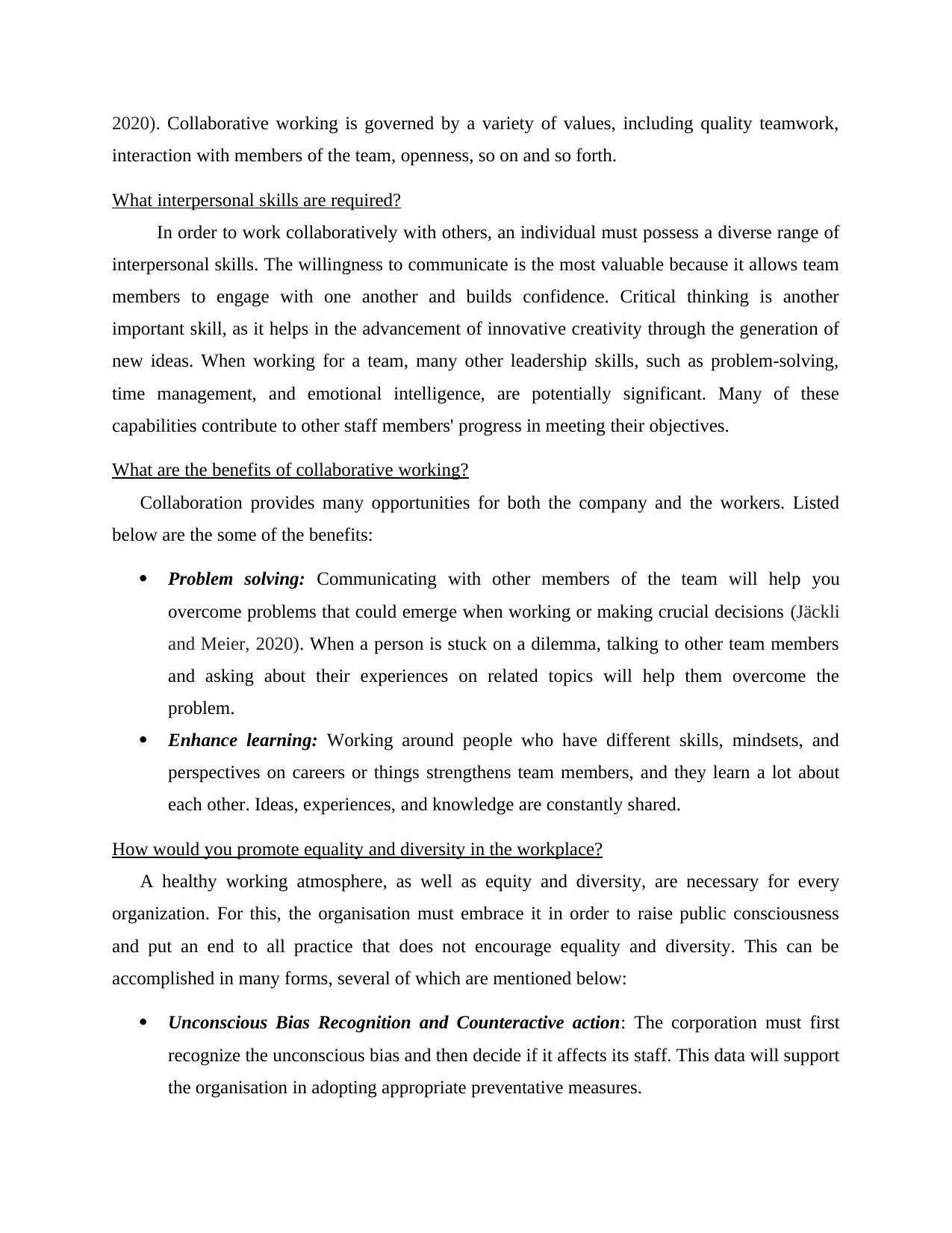
2020). Collaborative working is governed by a variety of values, including quality teamwork,
interaction with members of the team, openness, so on and so forth.
What interpersonal skills are required?
In order to work collaboratively with others, an individual must possess a diverse range of
interpersonal skills. The willingness to communicate is the most valuable because it allows team
members to engage with one another and builds confidence. Critical thinking is another
important skill, as it helps in the advancement of innovative creativity through the generation of
new ideas. When working for a team, many other leadership skills, such as problem-solving,
time management, and emotional intelligence, are potentially significant. Many of these
capabilities contribute to other staff members' progress in meeting their objectives.
What are the benefits of collaborative working?
Collaboration provides many opportunities for both the company and the workers. Listed
below are the some of the benefits:
Problem solving: Communicating with other members of the team will help you
overcome problems that could emerge when working or making crucial decisions (Jäckli
and Meier, 2020). When a person is stuck on a dilemma, talking to other team members
and asking about their experiences on related topics will help them overcome the
problem.
Enhance learning: Working around people who have different skills, mindsets, and
perspectives on careers or things strengthens team members, and they learn a lot about
each other. Ideas, experiences, and knowledge are constantly shared.
How would you promote equality and diversity in the workplace?
A healthy working atmosphere, as well as equity and diversity, are necessary for every
organization. For this, the organisation must embrace it in order to raise public consciousness
and put an end to all practice that does not encourage equality and diversity. This can be
accomplished in many forms, several of which are mentioned below:
Unconscious Bias Recognition and Counteractive action: The corporation must first
recognize the unconscious bias and then decide if it affects its staff. This data will support
the organisation in adopting appropriate preventative measures.
interaction with members of the team, openness, so on and so forth.
What interpersonal skills are required?
In order to work collaboratively with others, an individual must possess a diverse range of
interpersonal skills. The willingness to communicate is the most valuable because it allows team
members to engage with one another and builds confidence. Critical thinking is another
important skill, as it helps in the advancement of innovative creativity through the generation of
new ideas. When working for a team, many other leadership skills, such as problem-solving,
time management, and emotional intelligence, are potentially significant. Many of these
capabilities contribute to other staff members' progress in meeting their objectives.
What are the benefits of collaborative working?
Collaboration provides many opportunities for both the company and the workers. Listed
below are the some of the benefits:
Problem solving: Communicating with other members of the team will help you
overcome problems that could emerge when working or making crucial decisions (Jäckli
and Meier, 2020). When a person is stuck on a dilemma, talking to other team members
and asking about their experiences on related topics will help them overcome the
problem.
Enhance learning: Working around people who have different skills, mindsets, and
perspectives on careers or things strengthens team members, and they learn a lot about
each other. Ideas, experiences, and knowledge are constantly shared.
How would you promote equality and diversity in the workplace?
A healthy working atmosphere, as well as equity and diversity, are necessary for every
organization. For this, the organisation must embrace it in order to raise public consciousness
and put an end to all practice that does not encourage equality and diversity. This can be
accomplished in many forms, several of which are mentioned below:
Unconscious Bias Recognition and Counteractive action: The corporation must first
recognize the unconscious bias and then decide if it affects its staff. This data will support
the organisation in adopting appropriate preventative measures.
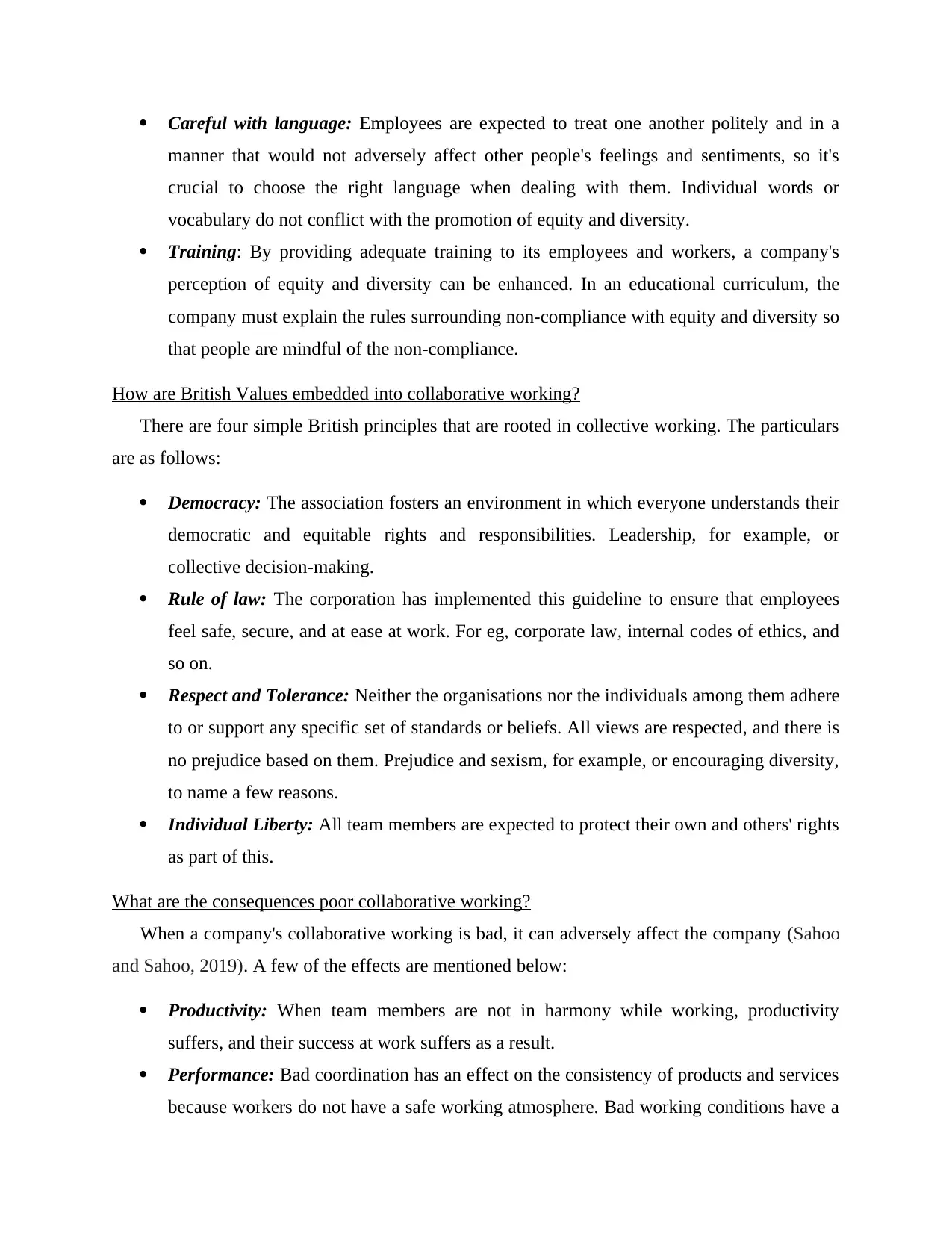
Careful with language: Employees are expected to treat one another politely and in a
manner that would not adversely affect other people's feelings and sentiments, so it's
crucial to choose the right language when dealing with them. Individual words or
vocabulary do not conflict with the promotion of equity and diversity.
Training: By providing adequate training to its employees and workers, a company's
perception of equity and diversity can be enhanced. In an educational curriculum, the
company must explain the rules surrounding non-compliance with equity and diversity so
that people are mindful of the non-compliance.
How are British Values embedded into collaborative working?
There are four simple British principles that are rooted in collective working. The particulars
are as follows:
Democracy: The association fosters an environment in which everyone understands their
democratic and equitable rights and responsibilities. Leadership, for example, or
collective decision-making.
Rule of law: The corporation has implemented this guideline to ensure that employees
feel safe, secure, and at ease at work. For eg, corporate law, internal codes of ethics, and
so on.
Respect and Tolerance: Neither the organisations nor the individuals among them adhere
to or support any specific set of standards or beliefs. All views are respected, and there is
no prejudice based on them. Prejudice and sexism, for example, or encouraging diversity,
to name a few reasons.
Individual Liberty: All team members are expected to protect their own and others' rights
as part of this.
What are the consequences poor collaborative working?
When a company's collaborative working is bad, it can adversely affect the company (Sahoo
and Sahoo, 2019). A few of the effects are mentioned below:
Productivity: When team members are not in harmony while working, productivity
suffers, and their success at work suffers as a result.
Performance: Bad coordination has an effect on the consistency of products and services
because workers do not have a safe working atmosphere. Bad working conditions have a
manner that would not adversely affect other people's feelings and sentiments, so it's
crucial to choose the right language when dealing with them. Individual words or
vocabulary do not conflict with the promotion of equity and diversity.
Training: By providing adequate training to its employees and workers, a company's
perception of equity and diversity can be enhanced. In an educational curriculum, the
company must explain the rules surrounding non-compliance with equity and diversity so
that people are mindful of the non-compliance.
How are British Values embedded into collaborative working?
There are four simple British principles that are rooted in collective working. The particulars
are as follows:
Democracy: The association fosters an environment in which everyone understands their
democratic and equitable rights and responsibilities. Leadership, for example, or
collective decision-making.
Rule of law: The corporation has implemented this guideline to ensure that employees
feel safe, secure, and at ease at work. For eg, corporate law, internal codes of ethics, and
so on.
Respect and Tolerance: Neither the organisations nor the individuals among them adhere
to or support any specific set of standards or beliefs. All views are respected, and there is
no prejudice based on them. Prejudice and sexism, for example, or encouraging diversity,
to name a few reasons.
Individual Liberty: All team members are expected to protect their own and others' rights
as part of this.
What are the consequences poor collaborative working?
When a company's collaborative working is bad, it can adversely affect the company (Sahoo
and Sahoo, 2019). A few of the effects are mentioned below:
Productivity: When team members are not in harmony while working, productivity
suffers, and their success at work suffers as a result.
Performance: Bad coordination has an effect on the consistency of products and services
because workers do not have a safe working atmosphere. Bad working conditions have a
⊘ This is a preview!⊘
Do you want full access?
Subscribe today to unlock all pages.

Trusted by 1+ million students worldwide
1 out of 14
Related Documents
Your All-in-One AI-Powered Toolkit for Academic Success.
+13062052269
info@desklib.com
Available 24*7 on WhatsApp / Email
![[object Object]](/_next/static/media/star-bottom.7253800d.svg)
Unlock your academic potential
Copyright © 2020–2026 A2Z Services. All Rights Reserved. Developed and managed by ZUCOL.





